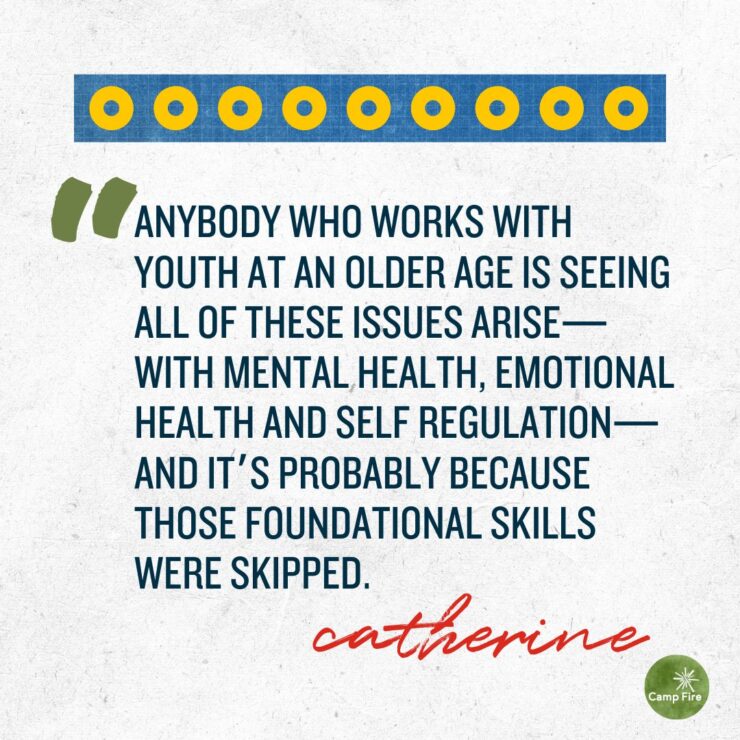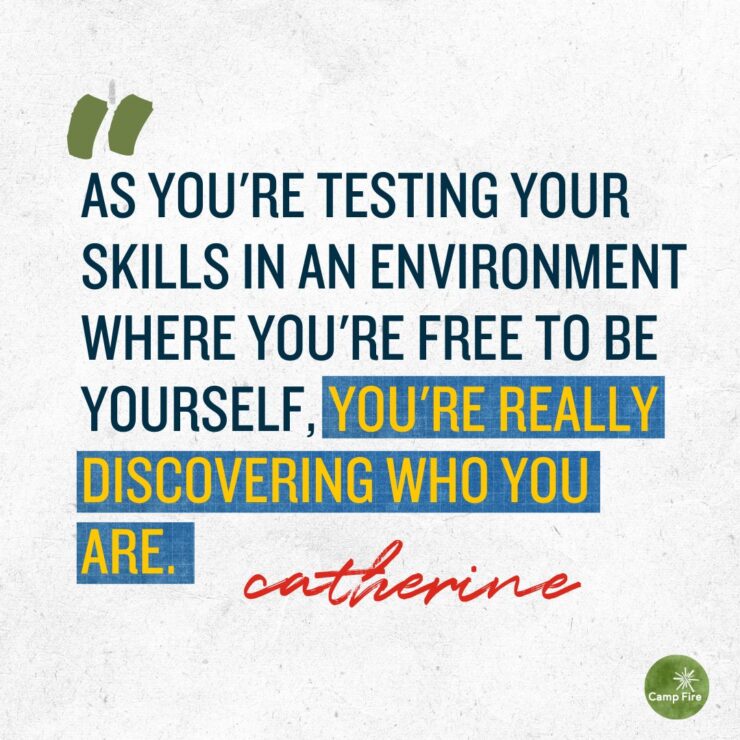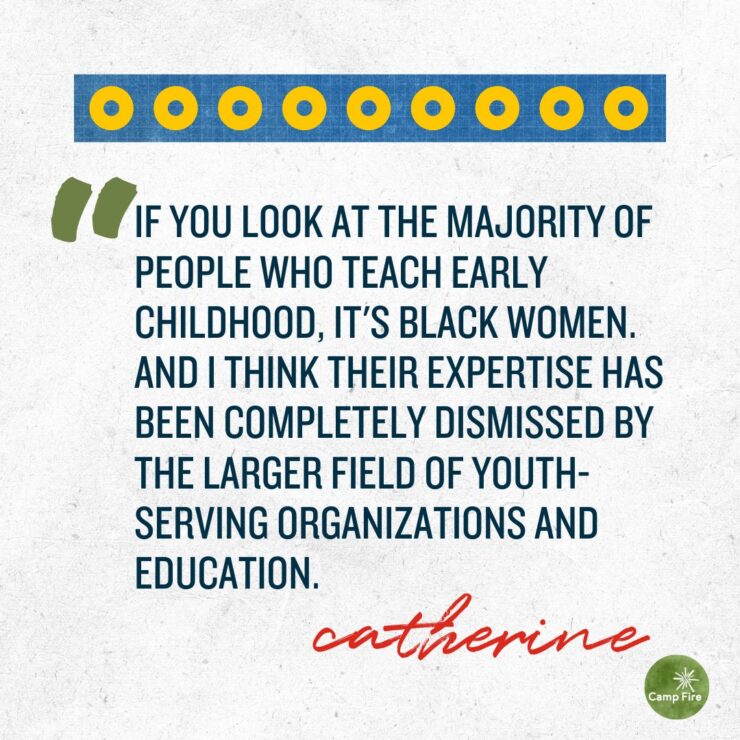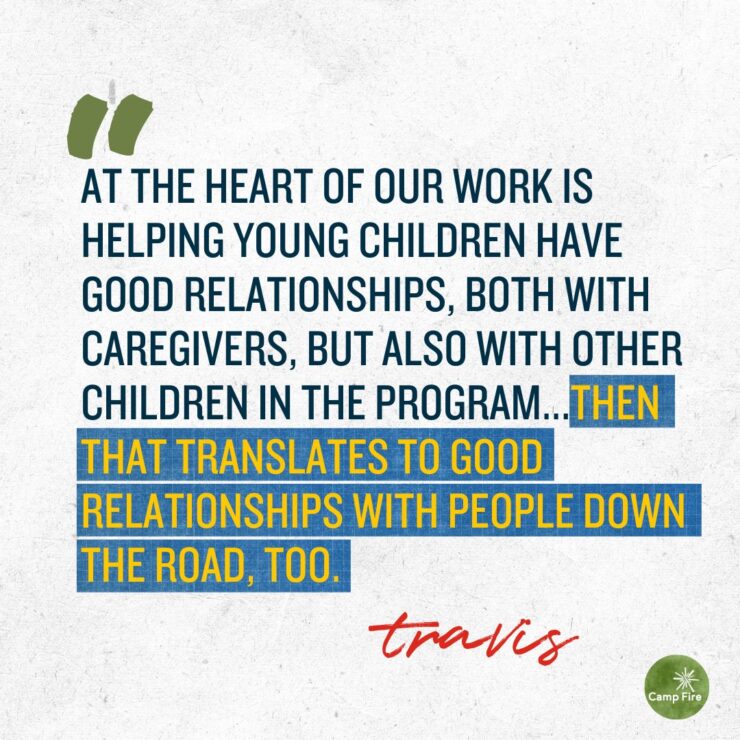Little Kids, Big Impact

The research is undeniable: Early childhood education lays the foundation for lifelong learning, health and well-being. Studies show that sustained, high-quality early childhood education narrows achievement gaps(1), improves health outcomes, increases high school graduation rates and is linked to better jobs and higher earnings in adulthood.(2)
 But access to high-quality early learning opportunities is far from equal! In the U.S., only around half of 3- and 4-year-olds are enrolled in preschool programs.(3) Families in higher-income areas tend to have better access to early education programs than those in disadvantaged neighborhoods. And systemic racism limits both the respect and resources available to early childhood educators: Low wages lead to high turnover and challenges in finding qualified early educators, with women of color disproportionately doing this critical work.
But access to high-quality early learning opportunities is far from equal! In the U.S., only around half of 3- and 4-year-olds are enrolled in preschool programs.(3) Families in higher-income areas tend to have better access to early education programs than those in disadvantaged neighborhoods. And systemic racism limits both the respect and resources available to early childhood educators: Low wages lead to high turnover and challenges in finding qualified early educators, with women of color disproportionately doing this critical work.
As the Center for American Progress notes, "Despite ongoing oppression and exclusion, women of color—and Black women in particular—have been leaders in the movement for child care, organizing community-led solutions such as family child care networks to fill child care needs in the absence of federal or state support."(4)
At Camp Fire, we are working to expand access to powerful early learning experiences, both by taking early education outdoors and by supporting early childhood educators. While 3% of the youth we served last year were pre-K and 29% were in kindergarten through 2nd grade, our impact on early learners extends beyond direct programming.
Here are two great examples:
Taking Early Childhood Education Outdoors
Catherine Hubbard, Outdoor and Nature Programming Manager for Camp Fire National Headquarters, joined the organization in early 2023. Before joining Camp Fire, Catherine spent 16 years at the Nature School at the Schlitz Audubon Nature Center in Milwaukee, Wisconsin. She started as a teacher and ended up as the director of the innovative outdoor-based school. With co-author Pattie Ensel Bailie, Catherine wrote a book based on her experiences there, Partnering with Nature in Early Childhood to help other educators take early childhood learning outside, and she also is developing an online course, “Social Emotional Learning (SEL) Outdoors,” for Camp Fire’s staff and volunteers.
Catherine emphasizes that high-quality early childhood programming lays a foundation of social-emotional skills that makes all other learning possible:
 “Anybody who works with youth at an older age is seeing all of these issues arise—with mental health, emotional health and self regulation—and it's probably because those foundational skills were skipped,” said Catherine.
“Anybody who works with youth at an older age is seeing all of these issues arise—with mental health, emotional health and self regulation—and it's probably because those foundational skills were skipped,” said Catherine.
She sees nature as one of our best SEL collaborators. “What I learned through my years at the Nature School is that I’m interested in how nature can be a partner in social emotional learning (SEL),” said Catherine. Getting very young folks outside aligns with Camp Fire’s three-part vision to connect them to the outdoors, others and themselves. (More than 40,000 kids of all ages took part in 79 Camp Fire environmental and outdoor programs across the country in our most recent program year!)
In addition to the obvious nature tie-in, Catherine says that learning outdoors creates more equitable classrooms that enable connection to others. “There's an endless amount of resources outside if nature is the source of your teaching materials,” said Catherine, comparing limited supplies in indoor spaces to the wealth of natural toys (sticks, sand, pinecones, etc.) and open space outside. “So there's enough to go around. It creates this sense of community.”
 Learning outdoors also offers opportunities for self-discovery: Young children navigate new environments, solve problems and see themselves as part of a larger ecosystem. “As you're testing your skills in an environment where you're free to be yourself, you're really discovering who you are.” explained Catherine.
Learning outdoors also offers opportunities for self-discovery: Young children navigate new environments, solve problems and see themselves as part of a larger ecosystem. “As you're testing your skills in an environment where you're free to be yourself, you're really discovering who you are.” explained Catherine.
She promotes the power of unstructured outdoor play for early childhood students. “It never works to take a group of 3-year-olds outside and start lecturing them about plants and animals, right?” she laughed. “That is not how they learn. They learn with their whole bodies, and they need to play and wiggle and throw themselves into the mud puddles.”
Catherine said this wisdom isn’t new; it’s just been discounted by those who have viewed early childhood education as “babysitting,” not foundational learning.
“Early childhood educators have been talking about SEL for a long, long time,” said Catherine. “If you look at the majority of people who teach early childhood, it's Black women. And I think their expertise has been completely dismissed by the larger field of youth serving organizations and education. For the past 30 years, they have been centering SEL and saying this is the most important thing. And it's only now that you have the leaders of think tanks saying this is important.”
 Empowering Early Childhood Educators
Empowering Early Childhood Educators
Camp Fire First Texas is doing the opposite of dismissing early educator’s experience: It’s amplifying it through their Early Education Workforce Development program.
Travis Davis, Vice President of the program, said the 20-year effort grew out of a long-time Camp Fire family’s passion for supporting early childhood education, the affiliate’s past experience running an early childhood center (now led by Early Head Start), and Camp Fire First Texas’s role as the area’s child care resource and referral touchpoint.
“The initial work of Camp Fire First Texas serving as Dallas / Fort Worth's Child Care Resource and Referral Agency has served us well to meet the needs of early childhood teachers and directors today," said Travis.
The Early Education Workforce Development program offers in-person and virtual workshops, an early education apprenticeship program, and Child Development Associate and Child Care Director Administrator credential courses. Travis says they try to offer professional development for people just starting their early childhood careers and those who are looking for more advanced continuing education.
There’s healthy crossover between the Workforce Development program and other Camp Fire offerings, especially afterschool initiatives. Travis is able to offer afterschool staff continuing education opportunities.
Most importantly, empowering effective early childhood educators aligns with Camp Fire’s mission, including helping very young children connect to others.
 “At the heart of our work is helping young children have good relationships, both with caregivers, but also with other children in the program,” said Travis. “Then that translates to good relationships with people down the road, too.” He cited an Early Learning Alliance study of how Fort Worth kindergarten teachers defined school readiness: Instead of focusing on academic readiness, the teachers were mostly concerned with incoming students’ social-emotional skills, such as getting along with peers, self-regulation and being able to follow simple instructions.
“At the heart of our work is helping young children have good relationships, both with caregivers, but also with other children in the program,” said Travis. “Then that translates to good relationships with people down the road, too.” He cited an Early Learning Alliance study of how Fort Worth kindergarten teachers defined school readiness: Instead of focusing on academic readiness, the teachers were mostly concerned with incoming students’ social-emotional skills, such as getting along with peers, self-regulation and being able to follow simple instructions.
“That’s what being ready is really all about,” said Travis. “And that comes back to people creating environments where children can feel included and supported. And where adults have the skills they need to help build successful relationships within their program.”
Starting a lifetime of connection early We all need to feel like we belong, whether we’re 2 or 92. And we all need to feel connected to each other.
“The essential human needs don't change,” Catherine said. “Really small children, middle-aged people, and really old people all need to feel that they matter. They all need to feel safe and loved. And they all thrive when they have access to the outdoor world. It doesn't really matter what age you are. It's just a human need.”
*****
1. “High-quality early child care and education: The gift that lasts a lifetime,” Brookings. 4 November 2021. Accessed 17 April 2024.
2. “Early Childhood Education,” Centers for Disease Control and Prevention. Accessed 17 April 2024.
3. “Enrollment rates of young children,” National Center for Education Statistics. May 2023. Accessed 17 April 2024.
4. “Data Dashboard: An Overview of Child Care and Early Learning in the United States,” Center for American Progress. 14 December 2023. Accessed 17 April 2024.
